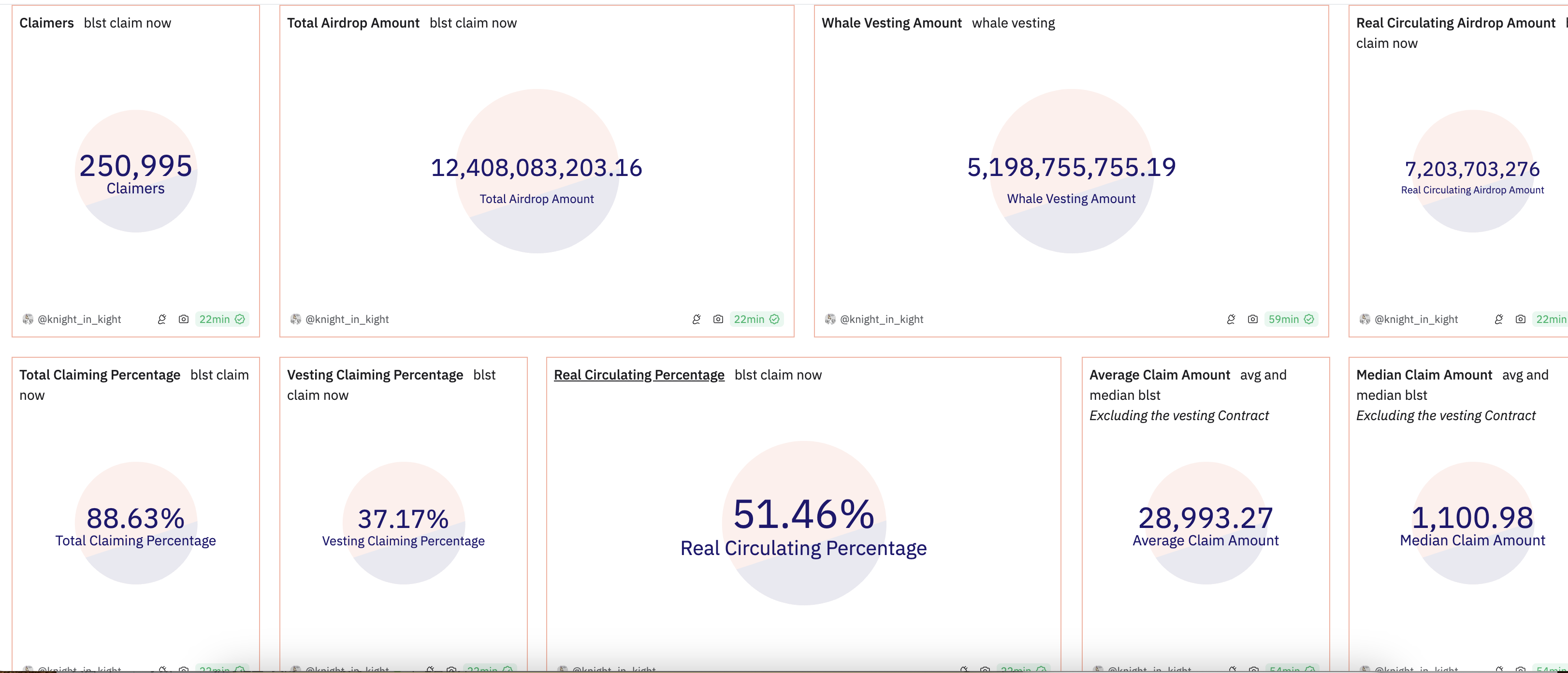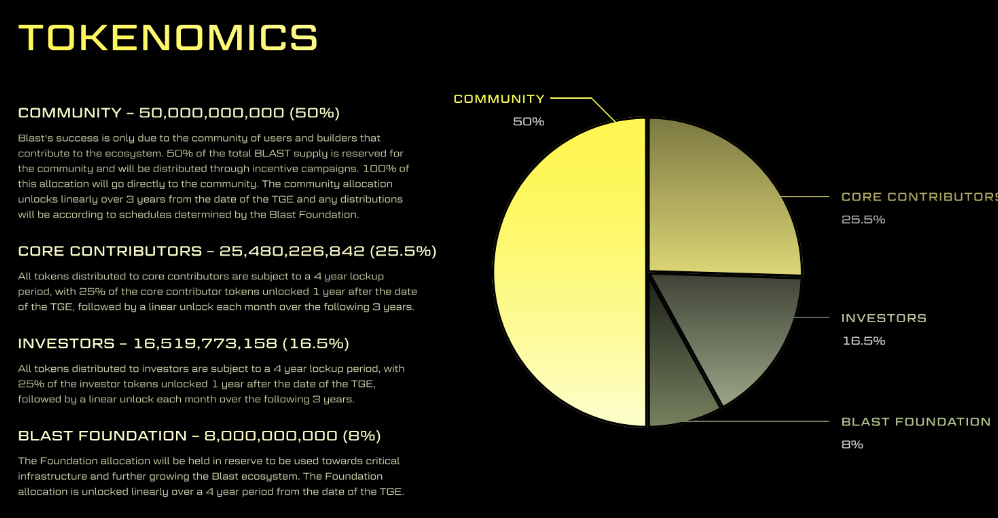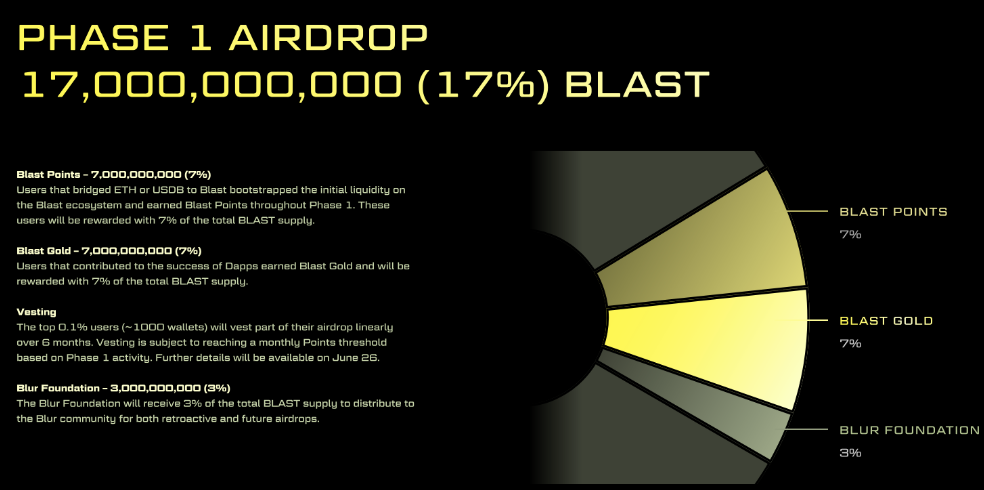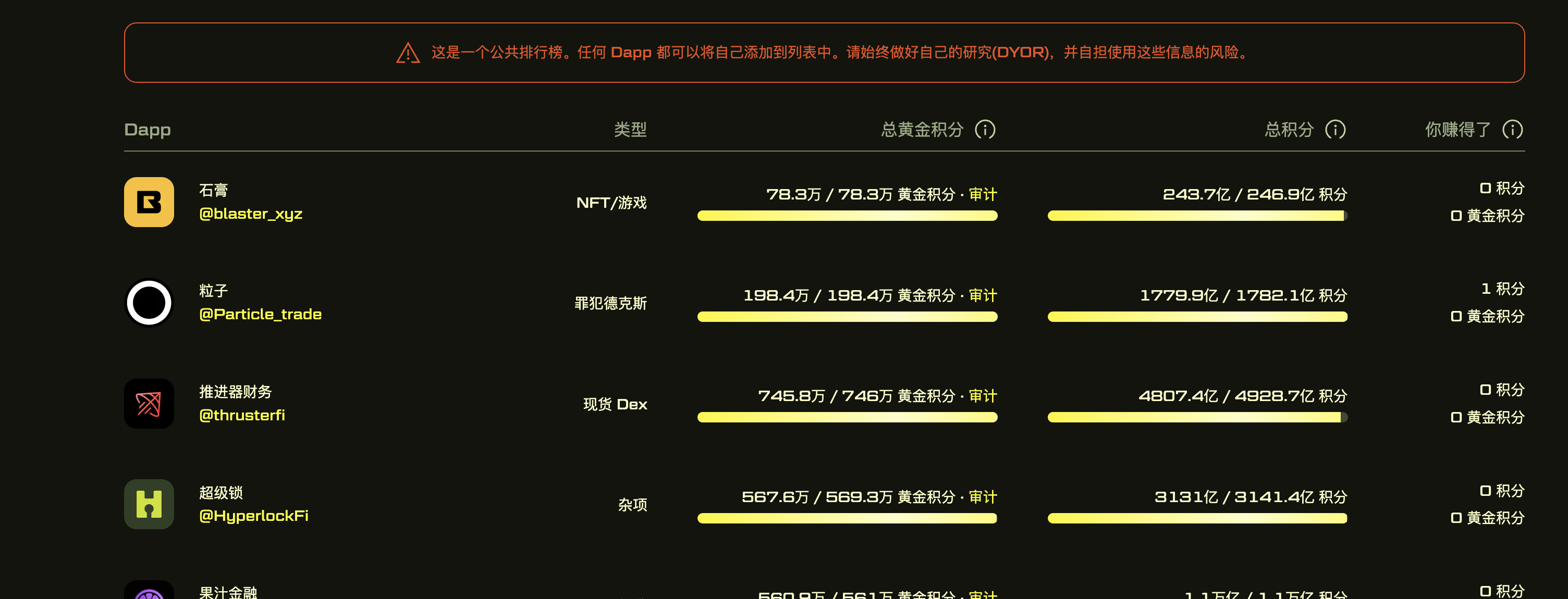On June 26, the long-awaited Blast airdrop is finally here. Prior to this, Upbit Exchange has announced the launch of Blast token trading. This news undoubtedly gave a shot in the arm to the Blast secondary market price.
Blast Airdrop is now live
After the airdrop arrived as scheduled, and with the arrival of 22:00 on June 26, accompanied by Tieshun’s speech, the Blast airdrop arrived as scheduled. It is not clear at present what the specific correlation between points and token airdrops is, but based on the author’s approximately 2.3 million points (ranked 55,000+ in the entire network) to obtain 50,000 BLAST tokens, the user with the highest ranking of approximately 23 billion points in the entire network can probably get 50 million tokens, which is about 1.5 million US dollars based on the initial issue price of US$0.03.

At the same time, the strategy of Blast market makers has also been clarified. Blast has allocated 220 million BLAST to 6 market makers for exchange market making. Currently, market makers are gradually transferring BLAST to CEX to prepare for the BLAST online trading at 23:00. The distribution is as follows: 80 million → Wintermute; 50 million → Manifold Trading; 30 million → GSR Markets; 20 million → Auros Global; 20 million → Amber Group; 20 million → Flow Traders.
As the airdrops are distributed one after another, some people are happy and some are worried, especially the proliferation of fraudulent phishing websites. Some users signed multiple phishing signatures on the fake Blast phishing website and lost $217,947. Blast even made the official post to remind users to be careful of fake Blast accounts and users need to be vigilant about related scams. At the same time, some users complained that the airdrop returns were not sincere: NextGenDigitalVenture partner Christian 2022.eth said that he deposited more than $50 million on Blast, but only received an airdrop of $100,000. Some even think that Blast is a scam. Tim Copeland, editor-in-chief of TheBlock, also said that every airdrop farmer must be forced to watch the Blast video when applying for the BLAST token-linked wallet. In addition, he claimed that Blast can apply for tokens on the App, but it is not connected to the App (the default token collection needs to be done on the Blast App). Tim Copeland also said that he may be suspected of clicking on a fraudulent link.
Despite some criticism, Blasts market performance remained strong after TGE. Just one hour after the airdrop started, BLAST FDV exceeded 2.6 billion US dollars, a single-day increase of more than 20%, and FDV rose to a maximum of 2.9 billion US dollars, in line with the early market forecast of 28 ± 3.
In addition, Coinbase also announced that it will launch Blast, which is another international big exchanges recognition of Blast besides Upbit. As of 11 am today, about 12 hours after the airdrop was opened, more than 2.5 million users have completed the claim, and a total of 12.4 billion tokens have been claimed, accounting for 88.63% of the total 17 billion.

Introduction to Blast and Token Economics
Blast is a Layer 2 blockchain where users can earn income by bridging assets. It offers incentives such as points, coins, airdrops, and earnings to attract users and developers to participate. There are many mining opportunities in the Blast ecosystem, such as Ambient, Juice, Synfutures, nftperp, and Munchables.
Blast was developed by Pacman and supported by Paradigm with the goal of creating native yield for Layer 2. When we deposit tokens into Layer 2, we are actually hosting the corresponding tokens in the smart contract on Layer 1 that corresponds to Layer 2. These are idle tokens and are not used to earn yield. Blast recommends converting ETH and stored stablecoins into stETH and DAI respectively, earning yield from staking rewards and vaults.

Blast’s token economics are divided into four main categories:
Community: 50,000,000,000 (50%). Blast owes its success to the community of users and builders who contribute to the ecosystem. 50% of the total BLAST supply is reserved for the community and will be distributed through incentive activities. 100% of this allocation will go directly to the community. The community allocation unlocks linearly over 3 years from the date of the TGE, and any allocations will be made according to the schedule determined by the Blast Foundation;
Core Contributors: 25,480,226,842 (25.5%). All tokens allocated to core contributors have a 4-year lockup period, with 25% of core contributor tokens unlocking 1 year after the TGE date, followed by monthly linear unlocking over the next 3 years;
Investors: 16,519,773,158 (16.5%). All tokens allocated to investors have a 4-year lockup period, with 25% of investor tokens unlocking 1 year after the TGE date, followed by monthly linear unlocking over the next 3 years;
Blast Foundation: 8,000,000,000 (8%). Foundation allocations will be reserved for critical infrastructure and further development of the Blast ecosystem. Foundation allocations unlock linearly over 4 years from the date of the TGE.
Blast Airdrop Rules

In the official Q2 report, the details of the first round of airdrops were disclosed. This round of airdrops will distribute 17% of the total BLAST (17 billion) to users. The 17% consists of: 7% Blast points, 7% Blast gold points, and 3% Blur Foundation. The specific details are as follows:
Blast Points: 7,000,000,000 (7%). Users who connect ETH or USDB to Blast bootstrap the initial liquidity of the Blast ecosystem and earn Blast Points in Phase 1. These users will be rewarded with 7% of the total BLAST supply.
Blast Gold Points: 7,000,000,000 (7%). Users who contribute to the success of the Dapp will be awarded Blast Gold Points and will be rewarded with 7% of the total BLAST supply.
Vesting: The top 0.1% of users (~1000 wallets) will vest a portion of the airdrop linearly over 6 months. Vesting is subject to reaching a monthly points threshold based on Phase 1 activity.
Blur Foundation: 3,000,000,000 (3%). The Blur Foundation will receive 3% of the total BLAST supply to be distributed to the Blur community for retroactive and future airdrops.
In general, Blast is currently quite competitive in terms of points. For example, I currently have 2.3 million points, which only puts me ahead of 8.5% of users in the Blast total points ranking. The points of the top-ranked user are already calculated in billions. After more than half a year of staking, Blasts TVL has reached 2.56 billion US dollars; the total number of users is close to 1.6 million. Assuming that the pre-market price is $0.03 and 17 billion tokens are evenly distributed, in the best case, each user can get a maximum of about $300 in airdrops, but if the points weight is taken into account, the value obtained by users with low points is even lower.

Price prediction and market analysis
Before the market opened, many professionals and institutions predicted the price of Blast: in the pre-market of WhalesMarket, the current lowest price of pending orders is $0.0297, and the latest price of executed historical orders is also close to this value, so the pre-market price can be determined to be $0.03.
Based on BLASTs total supply of 100 billion and an initial allocation of 17 billion, the corresponding FDV is US$3 billion and the circulating market value is US$510 million.
The reference data of the circulating market value of other Layer 2 projects are as follows: ARB is $2.7 billion, OP is $2 billion, STRK is $950 million, and ZK is $630 million. According to the data provided by L2 BEAT, Blasts TVL is lower than Arbitrum and Optimism, but higher than ZKsync and Starknet, and the price is slightly underestimated. However, considering the markets increasingly low recognition of Layer 2 tokens, it can still be considered that the current price and circulating market value are within a reasonable valuation range.
Analysis of BLASTs market prospects and potential
In the long run, the market prospects and potential of BLAST are affected by many factors.
First, Layer 2 solutions are becoming increasingly important in the blockchain industry, as they can improve the scalability and performance of main chains such as Ethereum and reduce transaction costs. As more users and developers flock to the Layer 2 ecosystem, BLAST, as a member of it, may benefit from the growth of the entire industry.
Secondly, Blast’s token economics design reflects the importance it places on the community and core contributors. The community allocation accounts for 50% of the total tokens, showing that the project hopes to attract and retain users and developers through incentive mechanisms. This design helps build an active and growing ecosystem and enhances the value of BLAST tokens.
However, the market also faces challenges.
First, the competition among Layer 2 projects is becoming increasingly fierce. Projects such as Arbitrum, Optimism, and ZKsync are constantly optimizing their technologies and ecosystems. Blast needs to continue to work hard on technological innovation, user experience, and ecosystem construction to stand out from the competition.
In addition, the markets recognition and acceptance of Layer 2 tokens will also directly affect BLASTs market performance. Although the current price and circulating market value are considered to be reasonable valuations, market sentiment and investor confidence may cause price fluctuations. Therefore, Blast needs to enhance market confidence through transparent governance and continuous technological innovation. Future Development and Strategy In order to succeed in the highly competitive Layer 2 market, Blast needs to develop and implement a series of strategies:
Technological innovation: Continue to optimize Layer 2 technology to improve transaction speed and security. Explore interoperability with other blockchain projects to enhance the breadth and compatibility of the ecosystem.
Ecosystem construction: Expand the application scenarios of the Blast ecosystem through cooperation with more Dapps. Encourage developers to build innovative applications on Blast and enhance the diversity and activity of the ecosystem.
Community participation: Strengthen interaction with the community and listen to feedback from users and developers. Enhance the communitys sense of participation and belonging through incentive mechanisms and transparent governance.
Marketing: Increase marketing efforts to increase the visibility and influence of BLAST tokens. Cooperate with major exchanges and media to expand Blast’s market coverage and user base.
Transparent governance: Ensure transparency and fairness of project governance and enhance the trust of investors and the community. Regularly publish project progress and financial reports to demonstrate the transparency and accountability of the project.
Summarize
The launch of Blast airdrop has attracted widespread attention, and its token economics and market prospects are highly anticipated. Despite facing competition and market challenges, Blast is expected to succeed in the Layer 2 market through strategies such as technological innovation, ecosystem building, and community engagement. With the participation of more users and developers, Blasts future development potential is worth looking forward to. We will continue to pay attention to Blasts dynamics and look forward to it creating more value and opportunities in the blockchain industry.
Follow us on TrendX
TrendX is the worlds leading artificial intelligence (AI) driven Web3 trend tracking and smart trading platform, aiming to become the preferred platform for the next 1 billion users to enter the Web3 field. By combining multi-dimensional trend tracking and smart trading, TrendX provides a full range of project discovery, trend analysis, primary investment and secondary trading experience.
Website: https://app.trendx.tech/
Twitter: https://twitter.com/TrendX_tech
Investment is risky. The project is for reference only. Please bear the risk yourself.










